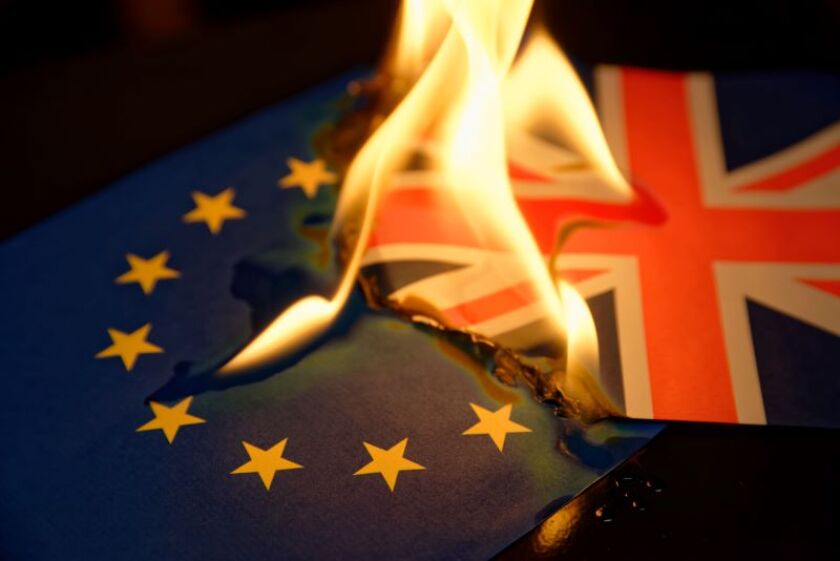Looking at the EU and UK trying to patch up their relations feels a bit like watching a divorced couple struggling to recreate a bond they should probably never have broken in the first place.
The truth is, the only way forward in the globalised world we live in is through cooperation – and certainly not through division. This is something that Trump’s America failed to understand in its time, and that Johnson’s Britain is now failing to grasp too.
If any tangible proof of this was needed, the Covid-19 pandemic was probably the best – and in many ways, the worst – possible example. If one country gets its health policy wrong, the entire world is at risk of going back into a much-dreaded lockdown.
Another case in point, of course, is the climate crisis. One country’s action will never be enough to reverse the entire planet’s carbon emissions. A coordinated global movement, instead, could meaningfully tip the balance just in time, saving us from hitting an ever-approaching wall.
As a child of the European Union, of course, I have always taken the Brexit discussion to heart. Born and raised in France to Bulgarian parents, with relatives living in the Netherlands, and having chosen the UK as my home since 2009, it’s safe to say I am a pure product of free movement and exchanges. Sadly, on the fateful day of June 23 2016, something happened that would forever make me see my new “home” under a different light.
I have understood many things since – mainly, that the Commonwealth and Anglo-Saxon culture are much more prescient than I ever knew, and that the UK has far more obvious parallels – economically, socially and even culturally – with countries such as Australia, Canada or New Zealand, than with its EU neighbours.
I used to see the UK as an open country. In spite of the government’s desperate willingness to promote a “global Britain”, I’m afraid this is definitely no longer how I perceive it. A global London, maybe, at best… but nothing more.
See also: Big changes expected on green transition under Biden
In a twisted, and perhaps slightly evil kind of way, England’s defeat during the Euro 2020 final felt like an undreamed-of and bittersweet revenge – a sort of payback for the way mainland Europeans have felt since being told five years ago that they may no longer be welcome in the country they had chosen to live in.
As a Brexiteer I once got into a heated debate with told me: “What does France have in common with the UK?” My response was to ask what Bulgaria, Romania, Slovakia or even Cyprus – to name a few – have in common with it. It is an important consideration. Does this apparent lack of obvious parallels between member states decidedly mean that the existence of the Union itself should be called into question? Isn’t the EU’s very modus operandi to help foster that richness and breadth of cultures, while allowing them to flow freely?
Needless to say, watching the EU come partly undone in recent years, with a growing number of countries – France, Hungary, etc. – sporadically questioning their membership, has been heartbreaking. There are, of course, many things that can be improved: a common health policy (which sorely lacked during the Covid-19 crisis), a fully-fledged banking and capital markets union, or the willingness to share risk.
But these should be seen as a work in progress, and deciding to abandon ship at this stage feels a bit like giving up on a beautiful love story because you are unwilling to work on the hard stuff, and think you are better off alone.
See also: Covid-19 and Brexit renew capital markets union emergency
The thing is, whether they like it or not, the UK and the EU are bound forever. Be it physically via the Channel Tunnel, or politically, economically and socially – by virtue of the countless commercial and cultural exchanges that occur between them on a daily basis.
The same goes for financial services. Colossal and all-encompassing pieces of EU financial regulation such as Mifid II, for instance – which, incidentally, would not be what it is today without the UK’s input – are proving a real headache to unbind. With the colossal healthcare and environmental challenges that the world has to take on, the last thing that businesses need right now is more complexity on the basis of nationalism and sovereignty.
Yet, regulatory divergence has only just started to take shape, with many areas likely to become contentious. Central to the debate these days are discussions around clearing and trading equivalence, which so far have all but opened the way for a single winner: the US.
Only two weeks ago, UK chancellor Rishi Sunak delivered his Mansion House speech, setting out his vision for the future of financial services and fixing new goals for the industry. Openness, competitiveness, technology and sustainability are set to be the guiding principles dominating the UK’s regulatory agenda.
See also: UK wholesale markets review eases Brexit anxieties
On the same day, HM Treasury (HMT) published a consultation that forms part of a formal review of the UK’s wholesale capital markets regime. The paper, HMT said, considers how the regime can be reformed to deliver a framework that is fair and outcomes-based but also maintains the highest regulatory standards. The most immediate changes could affect the share trading obligation under Mifid II and double volume caps.
The EU, for its part, has also launched a wave of reviews and consultations in recent months, covering a vast array of regulations, including the European Markets Infrastructure Regulation (Emir), the Securities Financing Transaction Regulation (SFTR), and the behemoth regulatory regime that is Mifid II.
But as each side continues to drive its own regulatory agenda, a harsh reality will keep rearing its ugly head: EU and UK policies are all but too intertwined to ever be fully independent from each other and entirely self-serving.
I will always believe in and support the European project. With or without the UK, the EU will live on.
See also: Brexit MOU is a timid step towards future cooperation

